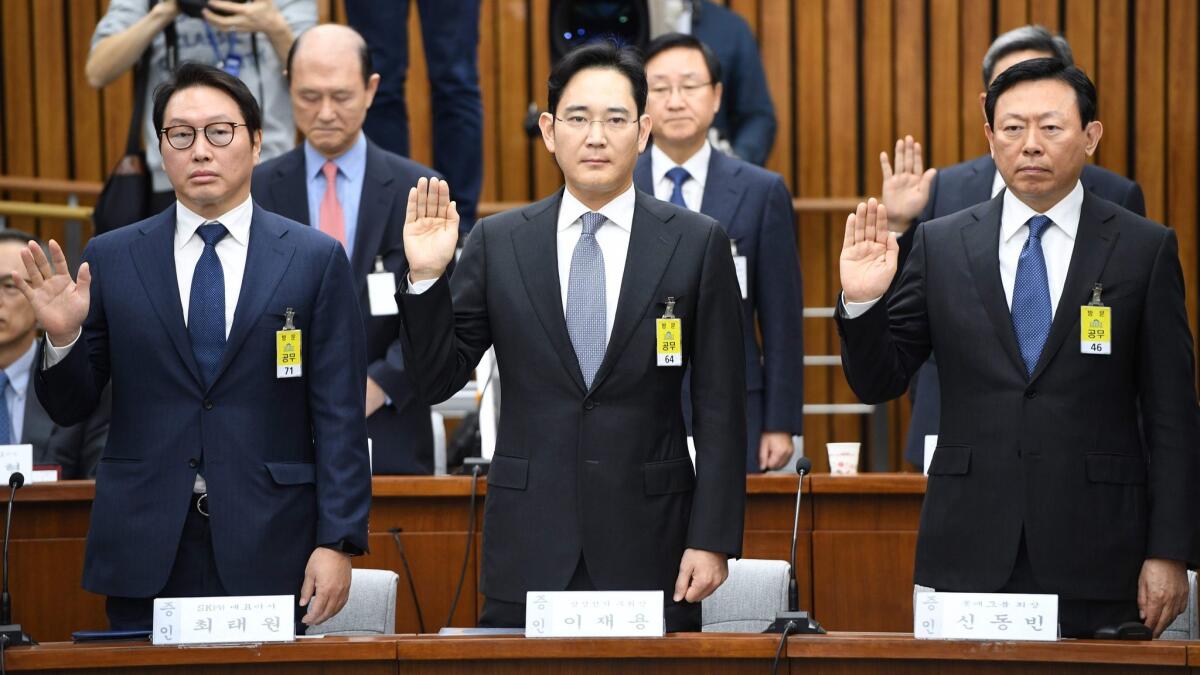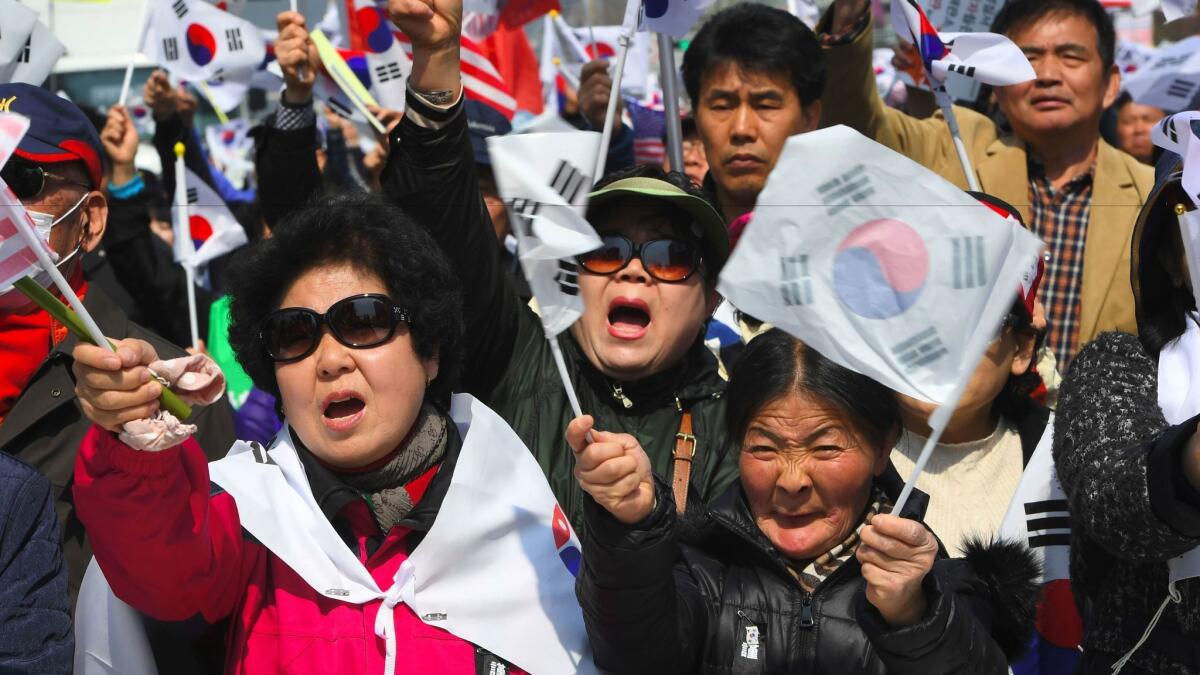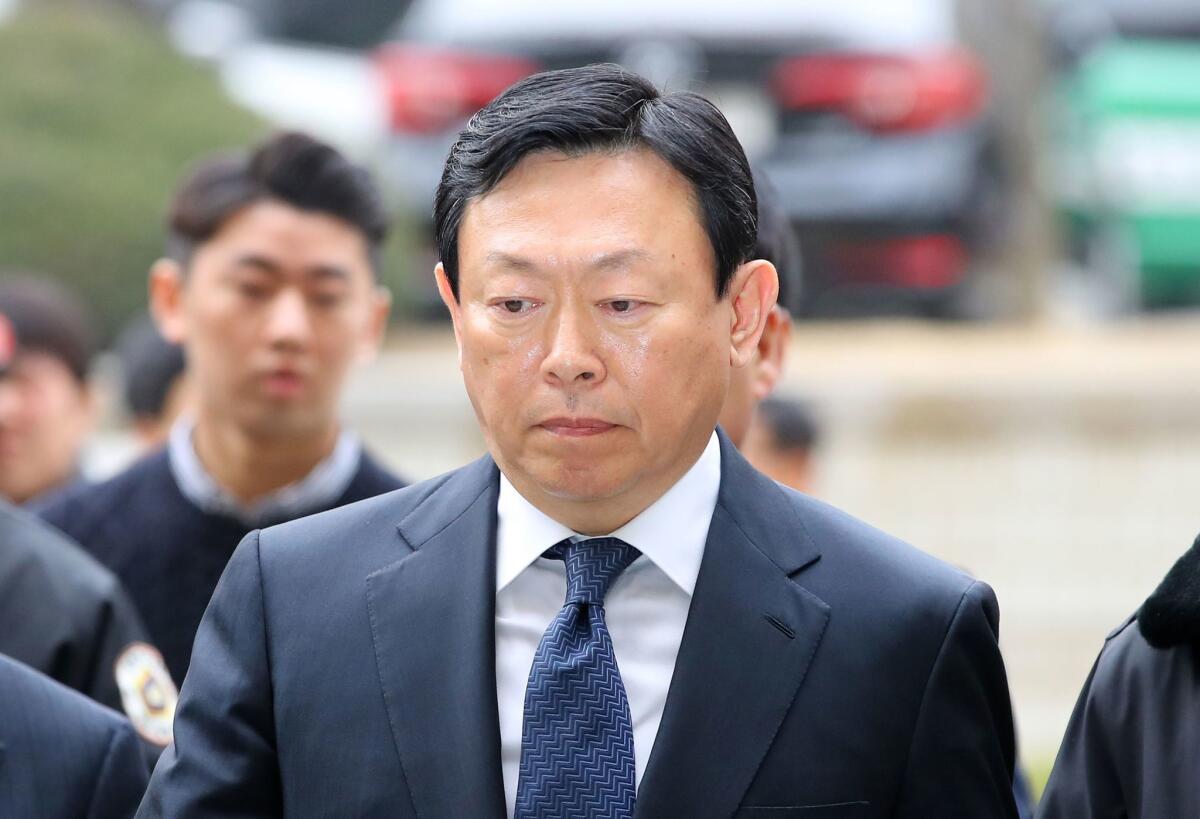South Korean prosecutors question heads of major conglomerates as corruption probe widens

- Share via
Reporting from Seoul — The corruption investigation that led to the removal of South Korea’s president this month appears to have widened yet again, with prosecutors in recent days questioning executives from two more of the nation’s top conglomerates about the case.
Prosecutors began questioning the former president, Park Geun-hye, on Tuesday morning over allegations that she used her office to seek bribes from the nation’s corporate titans for a longtime confidant, among other allegations.
Ahead of that effort, however, prosecutors over the weekend broadened the case by questioning Chey Tae-won, the chairman of SK Group, and Jang Sun-wook, who heads the lucrative duty-free business for Lotte Group, a major retailer. Then on Monday, Kwon Oh-joon, chairman of POSCO, the world’s fourth-largest steelmaker, testified about his own company’s relationship to the scandal, which was already under investigation.
The three executives have been drawn into the criminal case because their firms were asked to donate millions of dollars — perhaps, authorities suspect, under political pressure — to businesses controlled by the disgraced former president’s confidant, Choi Soon-sil. She remains jailed and is facing trial on numerous charges.
The three recent examples of corporate officials being summoned before authorities are the latest revelations in a blockbuster investigation that began six months ago amid allegations that Choi, who had no government title, used her access to the president to see and edit sensitive documents.
More than two dozen people have since been charged with various crimes, including the de facto leader of the Samsung Group, Lee Jae-yong, one of the nation’s most-powerful men. Several former aides to Park have also been charged, including two amid allegations that they created a blacklist to punish artists and others who were critical of the president’s administration.
The case could have stalled two weeks ago when a team of appointed special prosecutors cut short their case under a statutory deadline. The president lost her job, in large part because of their work, around that time. Before leaving, a spokesman for the group, Lee Kyu-chul, warned that “more people and branches” were involved.
His statement now appears to carry more weight.
The special prosecutors’ work was turned over to local prosecutors, and it appears to have propelled the case further into the murky ties between politics and business that are characteristic of South Korea’s relatively young democracy.
“The core subject of this team’s investigation has been the abuse of power to monopolize state affairs for personal interest and the collusive links between business and politics,” said Park Young-soo, who led the special investigation.
The prosecutors now appear to be zeroing in on Park Geun-hye, who no longer enjoys presidential immunity after the National Assembly impeached her in December and a constitutional court upheld her removal from office earlier this month. She left the presidential complex more than a week ago to live as a civilian in Seoul’s upscale Gangnam district.

Park, the daughter of a former South Korean military dictator, addressed a sea of reporters outside the prosecutors’ office on Tuesday after a high-speed motorcade from her home wound through the streets of southern Seoul.
“I feel apologetic toward the nation’s citizens. I’ll cooperate in the questioning sincerely,” she said.
Park has denied the allegations by saying she never acted outside the nation’s interest. She also faces questions about whether she abused her power.
Park has previously declined to discuss the case with prosecutors or the judges who decided her fate on March 9.
Several of South Korea’s largest companies, known as chaebol, have admitted donating money to Choi, the daughter of a deceased cult leader. Some have said they felt pressure to donate when asked by the president.
In Samsung’s case, prosecutors allege that more than $30 million in donations — including a $900,000 horse for Choi’s daughter, an elite equestrian athlete — prompted Park to direct officials to help pave the way for approval of a corporate merger. The tech giant has denied that allegation and said the truth will be revealed in court.
The details about the executives pulled into the case in recent days are less clear.
Chey, chairman of SK Corp., the third-largest South Korean conglomerate with holdings in energy, chemicals and telecommunications, was just released from prison for corporate malfeasance and is back in charge of his company. He received a pardon from Park in the summer of 2015. She said at the time that she granted it to spark the nation’s economy.
Chey smiled to the news media before entering to speak with the prosecutors, but made no statement. He left 13 hours later, at 3 a.m. Sunday.

It’s unclear what drew Lotte Group, which faces a continuing but unrelated probe involving its family executives, into the Park case. Media reports have speculated that the company’s $11 million in donations to Choi’s businesses, which came in two payments, might have been intended to help it keep a grip on the lucrative duty free business, or gain some other favor.
Lotte spent much of 2016 recovering from an embarrassing scandal that began with infighting over dynastic control of the company and a highly publicized raid by prosecutors on its headquarters. Its executives are on trial now for numerous unrelated corporate charges. Its alleged donations to Choi’s businesses were returned, according to local media reports, but questions remain about whether the original payments were for political favors.
Kwon, POSCO’s chairman, testified in Choi’s trial on Monday. He told the court that his company had no pending issues before the government, but that he felt compelled to donate funds to what he considered dubious foundations to avoid corporate complications from government officials.
“They were made under pressure, rather than voluntarily,” Kwon said.
Stiles is a special correspondent.
ALSO
Secretary of State Rex Tillerson in Asia calls for ‘different approach’ to confront North Korea
He defended the sacred lands of Mexico’s Tarahumara people. Then a gunman cut him down
UPDATES:
5:50 p.m.: This article was updated with more details, including the former president’s comments outside the prosecutors’ office.
This article was originally published at 9:50 a.m.
More to Read
Sign up for Essential California
The most important California stories and recommendations in your inbox every morning.
You may occasionally receive promotional content from the Los Angeles Times.











